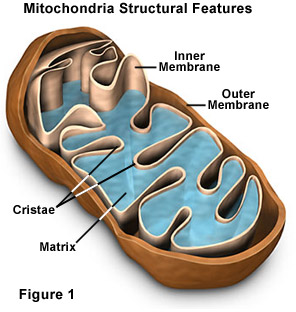How does body energy
work?
All your cells have power plants in them called mitochondria
(except for red blood cells). The
mitochondria pump out ATP (adenosine triphosphate). The ATP is “burned” by your body for
energy. Adenosine triphospate used during exercise is replaced by both odidative and non-oxidative resynthesis. You can worry about that part later.
The amount of energy you have throughout the day depends on
how much ATP your mitochondria can produce.
Your ATP production levels vary
according to all sorts of factors like diet, genetics, thyroid activity and…
age. Mitochondria efficiency can
decrease by up to 1% per year. Over 10
years, that is a huge drop in energy levels.
You might be tempted to think that certain “lucky” people can exercise because they naturally have lots of energy. But it’s just the opposite – those people have lots of energy because they exercise.
Issues like Chronic Fatigue Syndrome and diabetes have been linked to mitochondrial dysfunction, so taking care of your mitochondria should be on your To-Do list.
Things that can cause
low energy
Low levels of Vitamin D, Niacin, B vitamins, zinc, iron, iodine,
testosterone, and serotonin can cause fatigue. If nothing else is helping you, talk to your
doc about checking your levels.
If you hop onto Pubmed, you will see that there are a
zillion reasons people have low energy.
If you have fatigue that is not helped by sleep, ask your doctor for
help. On the bright side, for nearly
every cause of low energy two of the primary solutions are the same!
What can I do about
it? Exercise!
The good news is that you can increase your body’s energy
production by exercising! Working out
increases your energy in three ways:
1.
Increased blood flow to the brain helps manage
stress and make decision making easier
2.
Increased mitochondria in your cells which in
turn increases your ATP resynthesis rate
3.
Stronger muscle and cardiovascular system make
your daily tasks easier
We all know we should be working out. But what if you are trying to get healthy
while fighting fatigue? Start easy. Walk
for 5 minutes on the morning. If that
goes well, do another 5 at night. Do
that 3 times per week and then increase your time slowly. Your body WILL adapt by producing more energy
– even if you feel like you want to die during the exercise. Mitochondrial specialist Dr. Donald Johns
calls this staying within your “energy envelope”. You want to work out enough to get your body running
at a higher speed without being unable to move two days later.
What can I do about
it? Diet!
This part isn’t rocket science. Eat nutrient rich foods that
are high in lean protein and low in fat and salt. Some people maintain that if you exercise you
can eat whatever you want. This is sort
of true. However, you can’t exercise out
of a bad diet. Your energy levels WILL
reflect the way you eat. Eventually, so
will your body. Not all calories are
equal and your mitochondria know it.
As a side note, a multivitamin won’t actually help you unless
you have a specific deficiency in some area. Before you start taking
eye-of-newt or whatever weird supplements that your neighbor sells – talk to
your doctor. If you actually DO have a mitochondrial
dysfunction you may need coenzyme Q10, creatine, B12 or any number of
things. Let a real doctor decide what
you need.
If low energy levels are keeping you from being healthy,
start with some diet and exercise changes.
If that doesn’t help over several weeks, talk to your doc and find out
if something else might be going on. The
good news is that no matter what your problem is, exercise is usually one of
the solutions. It’s time to start using that fact for your own advantage.
Wu I-C et al,
“Metabolic Analysis of 13C-labeled Pyruvate for Noninvasive Assessment of
Mitochondrial Function,” Annals
NY Acad Sci 1201 (2010): 111-120.
Lo M-C et al,
“Glycoxidative Stress-induced Mitophagy Modulates Mitochondrial Fates,” Annals NY Acad Sci 1201 (2010):
1-7.
Clay A et al,
“Mitochondrial Disease,” Chest 120
(2001): 634-648.
Kim J et al,
“Role of Mitochondrial Dysfunction in Insulin Resistance,” Circ Res 102, no. 4 (2008):
401-414.
Lane RJM et al, “Muscle Fibre Characteristics and Lactate
Responses to Exercise in Chronic Fatigue Syndrome,” J Neurol Neurosurg Psychiatry 64 (1998): 362-367.
Choi E-Y, Cho Y-O, “Effect of Vitamin B-6
Deficiency on Antioxidative Status in Rats with Exercise-Induced Oxidative
Stress,” Nutrition Res Practice
3, no. 3 (2009): 208-211.
Personal communication from Donald Johns,
M.D. when he was chairperson of Neurology at Beth Israel-Deaconess Hospital in
Boston, MA.

No comments:
Post a Comment